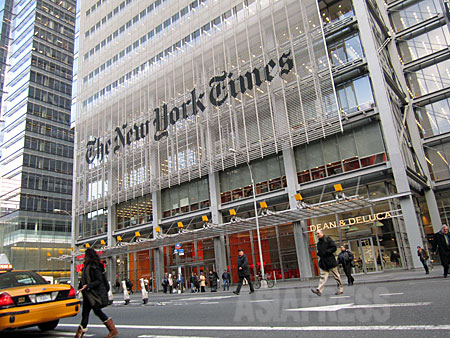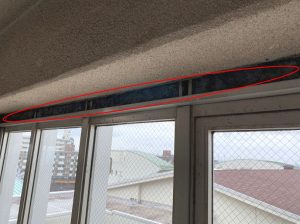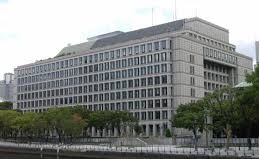Yoi Tateiwa(ジャーナリスト)
【連載開始にあたって 編集部】
新聞、テレビなどマスメディアの凋落と衰退が伝えられる米国。経営不振で多くの新聞が廃刊となりジャーナリストが解雇の憂き目にさらされるなど、米メディアはドラスティックな構造変化の只中にある。 いったい、これから米国ジャーナリズムはどこに向かうのか。米国に一年滞在して取材した Yoi Tateiwa氏の報告を連載する。
第1節 ウィッキーリークスと調査報道(7)
◆ ニューヨークタイムズとWL(ウィッキーリークス)

パネラーが全て着席した。ニューヨークタイムズは編集局長のビル・ケラーの隣に社内弁護士も加わっている。それは、その後のやり取りを予想してのことだったのだろうか。
バーグマンは最初に挨拶に立っただけで、司会は務めなかった。このパネルディスカッションについて説明し、後に特別ゲストがあるので楽しんで欲しいという趣旨のことを述べて、著名なジャーナリストのジャック・シェイファー(Jack Shafer)に司会を託した。
まずパネラーがそれぞれのメディアでどのようにWLを扱ったかを説明した。イギリスの日刊紙、ガーディアン(Guardian)のニック・デイビス(Nick Davies)は最初のアサンジとの出会いから、公電を入手した細かい経緯を説明した。それは興味深い内容だったが、これはガーディアンが後に出版した「WikiLeaks」に詳しいので省かせてもらう。
注目を浴びたのは、ビル・ケラー(注1)だった。それには理由が有る。前述の通り、ニューヨークタイムズはアメリカのメディアで唯一、公電を事前に提供された。その時に、ライバル各社がどのような思いだったかは、ワシントンDCで開かれたセミナーでのワシントン・ポストのカレン・ディヤングの言葉で紹介した。
ところがニューヨークタイムズはその後、手のひらを返したかのようにWL批判に転じる。
「ニューヨークタイムズはアメリカ政府がアサンジを訴追する可能性が出てきた為に裏切ったのではないか」
会場で、そのような推測を口にするジャーナリストは珍しくなかった。アメリカのメディアにおいて圧倒的な存在感を示すニューヨークタイムズ。「しかし」と書くべきか、「それだけに」と書くべきか、WLに関するニューヨークタイムズの置かれた立場は微妙なものになっていた。
淡々と自社の立場を説明するケラー。ここで司会のシェイファーが、次のような質問をケラーに行った。
「ニューヨークタイムズはアサンジを情報源(news source)と考えているのか?」
かつて冷戦時代にモスクワ支局長を務めたこともあるケラーは顔色を変えずに、「情報源だ」と語った。
(つづく)
(注1)ビル・ケラー経歴(英文)
Bill Keller is an Op-Ed columnist for The New York Times and writes for The New York Times Magazine. His column appears on alternate Mondays.
From July 2003 until September 2011, he was the executive editor of The Times, presiding over the newsroom during a time of journalistic distinction, economic challenge, and transformation. During his eight years in that role, The Times sustained and built its formidable newsgathering staff, winning 18 Pulitzer Prizes, and expanded its audience by mastering the journalistic potential of the Internet. The newsroom also participated in the creation of a digital subscription plan to help secure the company's economic future.
Mr. Keller was succeeded by Jill Abramson, a former investigative reporter and Washington bureau chief who had been one of his two top deputies since 2003.
Before becoming executive editor, Mr. Keller had spent two years as a senior writer for The New York Times Magazine and an Op-Ed columnist. He served as managing editor from 1997 to September 2001 after having been the newspaper's foreign editor from June 1995 to 1997.
As chief of The Times bureau in Johannesburg from April 1992 until May 1995, he covered the end of white rule in South Africa.
From December 1986 to October 1991, Mr. Keller was a Times correspondent in Moscow, reporting on the easing and ultimate collapse of Communist rule and the breakup of the Soviet Union. In 1989, he won a Pulitzer Prize for his coverage.
Mr. Keller joined The New York Times in 1984 as a domestic correspondent based in the Washington bureau, reporting variously on labor, agriculture and military affairs.
Before coming to The Times, Mr. Keller was a reporter for The Dallas Times Herald, the Congressional Quarterly Weekly Report in Washington and The Portland Oregonian.
Mr. Keller graduated from Pomona College with a B.A. degree in 1970 and is a member of the college's board of trustees.
He is the author of "The Tree Shaker: The Story of Nelson Mandela," published in January, 2008, by Kingfisher.
【ニューヨークタイムズ オピニオンページより】
<<<連載・第6回 記事一覧 連載・第8回>>>
















